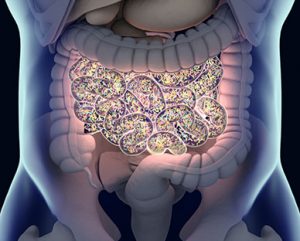Intermittent fasting has become the new health trend, with several different plans that feature short-term calorie restriction offering a variety of benefits. While some people write off fasting as just another dieting fad, a growing body of research is showing interesting health effects. According to a new study, fasting boosts gut health and may even function as a metabolic reset button.
Fasting: Just a Fad?
Fasting has been used for millennia for spiritual effects. However, it is becoming popular in modern times not as a way to get in touch with your higher nature but as a natural way of improving whole-body health.
There are several types of fasting, from short term (12-24 hour) calorie restriction to longer fasts. All have one thing in common: They deprive the body of food long enough that the body switches its style of metabolism. Instead of burning glucose to fuel our cells, the body burns fat to produce ketones. This changes the way our cells function on a basic biochemical level.
Although this may sound like “woo,” it appears to have a variety of positive health effects. Studies have found that fasting and even very short term calorie restriction can slow down aging, reduce levels of oxidative stress, and reduce the effects of common chronic illnesses. In addition, a new study suggests that fasting may affect gut bacteria, increasing amounts of positive microbes while decreasing bacteria that cause illness.
The Microbiome and Metabolism
Humans are never truly alone. We share our bodies with trillions of bacteria that colonize our skin, eyes, and digestive tract. People with an imbalance of these bacteria suffer a variety of negative effects, from digestive tract disorders to depression. In addition, the microbiome appears to have a variety of effects on our metabolism.
Beneficial gut bacteria are essential to effective digestion. They break down certain vitamins and nutrients so they can be efficiently absorbed. These microbes also release hormones that improve the way we use insulin, reduce hunger and improve metabolism. Several metabolic diseases such as diabetes have been linked to changes in the microbiome.
In addition to being a very effective weight loss plan, fasting changes the way our body interacts with food, improving the efficiency of our mitochondria. In addition, it may improve health by changing the makeup and the activity of the bacteria that line our gastrointestinal tracts.
How Fasting Boosts Gut Health

In addition, fasting appears to improve the activity of stem cells in the digestive tract. Young people have ample amounts of stem cells that differentiate to become new cells to replace damaged or dysfunctional ones. As we age, our bodies lose the ability to repair tissues due to a decrease in these stem cells. Any improvement in stem cell function can decrease the long term damage and loss of function associated with aging.
When we fast, our stem cells also switch to metabolizing fats rather than glucose. This change has been called a “metabolic switch” because it can have far-reaching effects on our metabolism and our health. According to new research, this may make stem cells more active and effective, particularly ones in our GI tract. This in turn can prevent some of the gradual damage that makes aging people more prone to intestinal problems.
Secrets to Healthy Fasting
Modern fasting is not merely a matter of giving up food for a certain time period. Healthy fasting requires special measures. For example, it is important to not become deprived of nutrients or protein. Many people who use intermittent fasting successfully eat high protein meals before and after the desired fasting period. In addition, it is important to take vitamins or eat vitamin-rich foods to keep levels of these essential elements high.
In addition, there are other ways to support a healthy microbiome. Researchers and doctors recommend eating fermented foods that are rich in lactobacillus and other beneficial bacteria. In addition, taking a probiotic and prebiotic supplement will help your microbiome diverse and healthy.
Our ancestors underwent intermittent fasting during times of famine. While we often view this as negative, it appears that our bodies are designed to work optimally with short term periods of calorie restriction. Introducing short periods of fasting into your life may help to improve your metabolism, reduce aging and help you to lead a generally healthier life.







